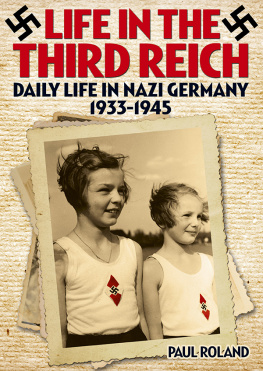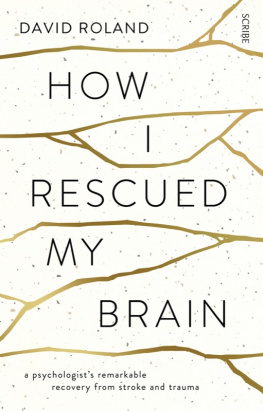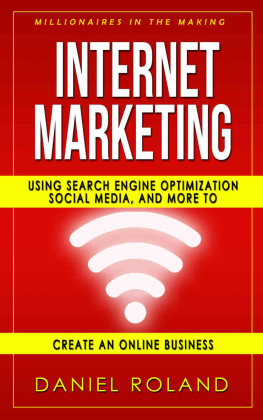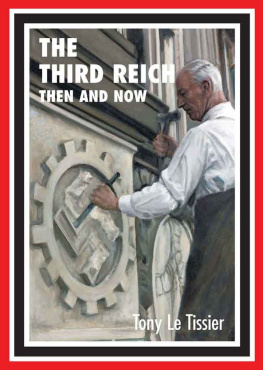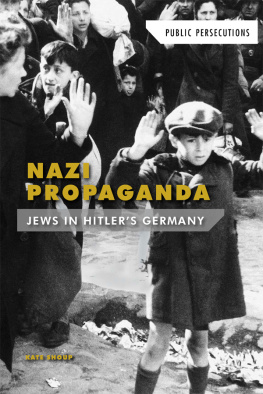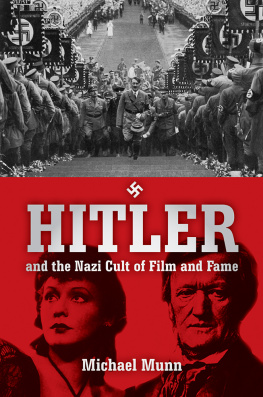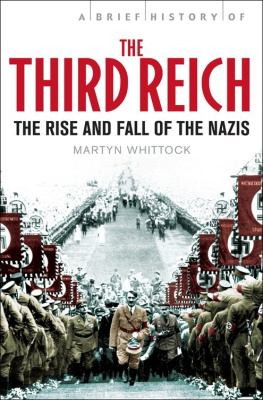Aftermath
After the war, Germany was invited to participate in an international cultural event, but those responsible for selecting the programme could not decide which song or piece of music would be suitable for them to perform. The German national anthem was out of the question because of its association with the Nazis, while Beethovens Ode to Joy was considered inappropriate under the circumstances. It was finally decided that the singers would perform an old folk tune, O du lieber Augustin, which tells of a drunkard falling into a plague pit and emerging unharmed and untroubled by his traumatic experience thanks to the numbing effects of the alcohol. It seemed a fitting choice.
The man who founded the Third Reich, who ruled it ruthlessly and often with uncommon shrewdness, who led it to such dizzy heights and to such a sorry end, was a person of undoubted, if evil, genius. It is true that he found in the German people, as a mysterious Providence and centuries of experience had moulded them up to that time, a natural instrument which he was able to shape to his own sinister ends.
(William L. Shirer, THE RISE AND FALL OF THE THIRD REICH: A HISTORY OF NAZI GERMANY)
Bibliography
Barnett, Victoria, FOR THE SOUL OF THE PEOPLE (Oxford University Press, 1998)
Berger, Thomas, LEBENSSITUATIONNEN UNTER DER HERRSCHAFT DES NATIONALSOZIALISMUS (Hannover, 1981)
Bielenberg, Christabel, THE PAST IS MYSELF (Corgi, 1988)
Engelmann, Bernt, IN HITLERS GERMANY (Schocken, 1992)
Heider Tisdale, Anneliese, CHRISTMAS TREES LIT THE SKY (AuthorHouse, 2012)
Hitler, Adolf, MEIN KAMPF (Jaico, 2007)
Hoffmann, Peter, THE HISTORY OF THE GERMAN RESISTANCE 19331945 (McGill Queens University Press, 1996)
Hosenfeld, Wilm, ICH VERSUCHE JEDEN ZU RETTEN: DAS LEBEN EINES DEUTSCHEN OFFIZIERS IN BRIEFEN UND TAGEBCHERN. Militrgschichtliches Forschungsamt, ed. Thomas Vogel (Deutsche Verlagsanstalt, Mnchen, 2004)
Kruger, Horst, A CRACK IN THE WALL: GROWING UP UNDER HITLER (Fromm International, 1966)
Large, David Clay, NAZI GAMES: THE OLYMPICS OF 1936 (W.W. Norton, 2007)
Massaquoi, Hans-Jrgen, DESTINED TO WITNESS: GROWING UP BLACK IN NAZI GERMANY (Harper Collins, 2009)
Mayer, Milton, THEY THOUGHT THEY WERE FREE (University of Chicago Press, 2013)
McKee, Ilse, TOMORROW THE WORLD (J.M. Dent and Sons, 1960)
Moorhouse, Roger, BERLIN AT WAR: LIFE AND DEATH IN HITLERS CAPITAL, 193945 (Vintage, 2011)
Roland, Paul, THE NUREMBERG TRIALS: THE NAZIS AND THEIR TRIALS AGAINST HUMANITY (Arcturus, 2012)
Roland, Paul, NAZI WOMEN: THE ATTRACTION OF EVIL (Arcturus, 2014)
Schnhaus, Cioma, THE FORGER (Granta, 2008)
Shirer, William L., THE RISE AND FALL OF THE THIRD REICH: A HISTORY OF NAZI GERMANY (Arrow, 1991)
Shirer, William L., BERLIN DIARY (Sunburst, 1997)
Shirer, William L., THE NIGHTMARE YEARS (Little Brown, 1984)
Strickland, Eycke, EYES ARE WATCHING, EARS ARE LISTENING: GROWING UP IN NAZI GERMANY, 19331946. A Memoir by Eycke Strickland (iUniverse, 2008)
Tubach, Frederic C., GERMAN VOICES (University of California Press, 2011)
Vaizey, Hester, SURVIVING HITLERS WAR: FAMILY LIFE IN GERMANY: 193948 (Palgrave, 2010)
Resources
Transdiffusion.org
Return2style.de
tikkun.org
historynet.org
theguardian.com
rijo.homepage.t-online.de
nptelegraph.com
eyckestrickland.com
renatazerner.com
The Nazis: A Warning from History (BBC, 1997)
The World At War Inside The Reich (ITV, 19734)
Chapter One
The Worst of Times
The Aftermath of 1918
The confused locksmith Drexler provided the kernel, the drunken poet Eckart some of the spiritual foundation, the economic crank Feder what passed as an ideology, the homosexual Roehm the support of the Army and the war veterans, but it was now the former tramp, Adolf Hitler, not quite thirty-one and utterly unknown, who took the lead in building up what had been no more than a back-room debating society into what would soon become a formidable political party.
(William L. Shirer on Hitlers takeover of the German Workers Party in 1921)
The Nazis did not attract their initial supporters through persuasive political argument, nor by appealing to their ideals and aspirations, but by simply promising to provide for their immediate and fundamental needs work and bread. Many who voted for them in the 1920s and even some of those who joined their ranks and marched under their banners during these early days of the struggle, sincerely and naively believed that National Socialism offered the only credible opposition to Bolshevism.
Not all of Hitlers early followers shared his virulent anti-Semitism, or subscribed to the more fanciful elements of his partys pseudo-vlkisch ideology, which declared that the Germans were descendants of an Aryan master race and were destined to rule over inferior nations.
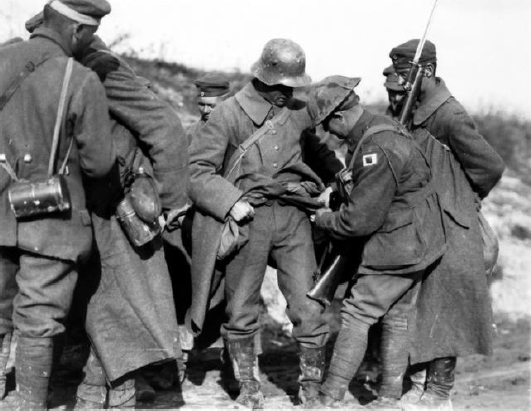
Defeat in November 1918 was seen as more than a military debacle. It brought humiliation to the German soldier who soon subscribed to the myth that the Army had been stabbed in the back by defeatism generated at home by weak, defeatist politicians.
In the immediate aftermath of the countrys defeat of November 1918, the population was weary, dispirited and looking for a leader with ready answers someone who could identify those who were to blame for their misfortunes. Families throughout the country were grieving for the incalculable loss of life, confounded by the sudden and unexpected capitulation of an army they had been assured was on the verge of victory, and embittered by the futility of the sacrifice they had made in vain for the Fatherland. This sense of despair was compounded by the abdication of the Kaiser and the new Weimar governments willing compliance with the punitive terms and conditions imposed by the Versailles Treaty. It is therefore no wonder that this poisonous atmosphere gave rise to extreme nationalism and the belief that the army had been betrayed, or stabbed in the back, to borrow a phrase attributed to General Ludendorff.
This grievous wound might have healed over time had it not been aggravated by the rampant inflation of 19223, which saw savings wiped out and wages devalued to the point where workers were being paid twice a day so that they could buy food while it was still affordable. Even so, it was not uncommon to view customers paying for produce with what had once been a months wages, all of which emphasized the fragility of the economy and the ineffectiveness of the Weimar government. Within a year the average price of a loaf of bread had risen from 165 marks to one and a half million.
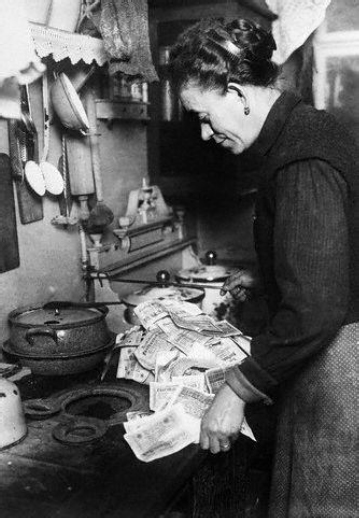
When inflation was at its height the German mark was of more value as fuel for the kitchen stove than as currency.
In every village, town and city, men, women and children could be seen begging for food and spare change, or asking for menial work of any kind. Into this desperate situation the Nazis appeared under the guise of the National Socialist German Workers Party with a promise of jobs for the unemployed and relief for the impoverished. In addition, they declared their intention to purge commercial institutions of Jewish influence and to rid German business of unfair competition (i.e. Jews). They vowed to crush the communists and put an end to the frequent and bloody skirmishes between rival political factions that made the streets unsafe for law-abiding citizens. They would also restore national pride by tearing up the hated Versailles Treaty and demanding the return of territory seized by the Allies after 1918. Every citizen was persuaded to believe it was his or her patriotic duty to vote for the programme. Hitlers critics accused him of being a crude, ill-educated rabble-rouser, but he articulated the peoples anger and sense of injustice more effectively than the professional politicians and it was evident that he had touched a raw nerve.
Next page
